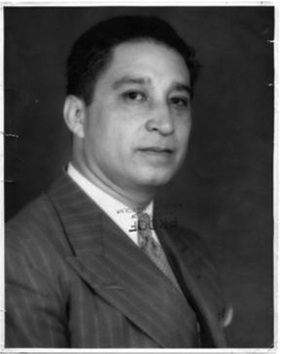Alonso S. Perales facts for kids
Quick facts for kids
Alonso S. Perales
|
|
|---|---|
 |
|
| 2nd President of the LULAC | |
| In office 1930–1931 |
|
| Preceded by | Ben Garza |
| Succeeded by | Manuel C. Gonzales |
| Personal details | |
| Born | October 17, 1898 Alice, Texas |
| Died | May 9, 1960 (aged 61) |
| Education | George Washington University Law School |
| Occupation | Attorney, diplomat |
Alonso S. Perales (October 17, 1898 – May 9, 1960) was an important Mexican American lawyer, diplomat, and civil rights activist. He lived and worked in Texas. He helped create the League of United Latin American Citizens (LULAC). Perales was also the second president of LULAC. He helped write the organization's rules. From 1924 to 1933, he also worked as a diplomat.
Contents
Early Life and Education
Alonso S. Perales was born on October 17, 1898, in Alice, Texas. His parents were Susana and Nicolás Perales. When he was only 6 years old, he became an orphan. He started working at a young age. Later, he married Marta Pérez, who owned a bookstore. They adopted one daughter and two sons.
Perales went to public schools in Alice. He then continued his studies at Draughn's Practical Business College in San Antonio, Texas.
During World War I, Perales joined the United States Army. He worked as a Field Army Clerk. After his service, he left the army in 1920. He then passed a special test and moved to Washington D.C.. While there, he continued his education. He earned a Bachelor's degree in Economics and Government. In 1925, he received his law degree from what is now the George Washington University Law School. Soon after, he returned to Texas. He was one of the first Mexican Americans to practice law in the United States.
Career Highlights
Working as a Diplomat
From the 1920s to the 1930s, Perales worked as a diplomat. A diplomat represents their country in other nations. He traveled to many places. These included the Dominican Republic, Cuba, Nicaragua, Mexico, and Chile.
Later, in 1945, he helped the Nicaraguan team. This was at the United Nations Conference on International Organization. This conference took place in San Francisco, California. During this meeting, leaders created the Charter of the United Nations. This document set up the United Nations.
Fighting for Civil Rights
Perales was very active in fighting for civil rights. Civil rights are the basic rights that all people should have. Many experts say he was one of the most important Mexican Americans of his time. He moved back to Texas. There, he worked to stop unfair treatment of people of Mexican descent. He used law, public speaking, and his writings to help.
He wrote two books called En Defensa de mi raza (In Defense of My People). These were first published in 1937. These books included essays, letters, and speeches. They showed the problems of unfair treatment in Texas. His book, Are We Good Neighbors?, came out in 1948. It looked at the unfair treatment and problems faced by people of Mexican and Latin American descent. This book also shared stories from people who experienced this unfairness.
In San Antonio, Texas, Perales worked with Maury Maverick. In the 1940s, he asked the Texas government to pass a law. This law would stop unfair treatment based on a person's background.
Founding LULAC
In the 1930s, Mexican Americans and other Latin American groups started to organize. They wanted to fight against unfair laws and practices in Texas. This led to groups like the Order of the Sons of America.
In 1929, several of these groups decided to join together. Perales was part of the League of Latin American Citizens. This group merged with others to form the League of United Latin American Citizens (LULAC). Perales, along with others like Ben Garza and José Tomás Canales, helped create LULAC. It became the oldest Hispanic civil rights organization in the United States. Perales, Canales, and Edwardo Idar wrote the LULAC constitution.
Perales also started LULAC Council 16 in San Antonio, Texas. He became LULAC's second president. As president, he helped create 24 new LULAC groups in South Texas. LULAC's official newsletter, LULAC News, said that Perales helped build the organization's spirit. This spirit was about courage, determination, and helping others.
One of his big successes was in 1930. He helped stop a bill called House Resolution 6465. This bill wanted to limit the number of Mexican immigrants coming to the United States. Perales, with other LULAC members, went to Washington D.C. They spoke against the bill in Congress. The bill did not pass.
Honors and Memorials
In 1977, a school in San Antonio, Texas, was named after him. It is called the Alonso S. Perales Elementary School.
In 2011, Perales' family gave his old papers and documents to Arte Público Press. This collection includes letters, LULAC papers, photos, and rare writings. These items are kept at the University of Houston's MD Anderson Libraries. After the donation, a conference was held to study Perales' work. A book of essays about him, In Defense of my people, came from this conference.
There is also a special online project called The Alonso S. Perales Correspondence. It shows visually how his letters and documents spread. It also shares information about Perales and LULAC.
Works
- En Defensa de mi raza, vol. I & II. (Artes Gráficas, 1937)
- Are We Good Neighbors? (Artes Gráficas, 1948)
- "La Evolución De La Raza Mexicana En Texas," La Prensa (San Antonio, TX), Sep. 13, 1927.
 | Anna J. Cooper |
 | Mary McLeod Bethune |
 | Lillie Mae Bradford |

